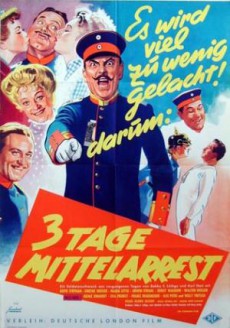| Three Days Confined to Barracks | |
|---|---|
 German film poster | |
| German | Drei Tage Mittelarrest |
| Directed by | Georg Jacoby |
| Written by |
|
| Produced by | Franz Tappers |
| Starring | Ernst Waldow Grethe Weiser Eva Probst |
| Cinematography | Erich Claunigk |
| Edited by | Martha Dübber |
| Music by | Michael Jary |
Production company | Standard-Filmverleih |
| Distributed by | Deutsche London-Film |
Release date |
|
Running time | 95 minutes |
| Country | West Germany |
| Language | German |
Three Days Confined to Barracks (German : Drei Tage Mittelarrest) is a 1955 West German comedy film directed by Georg Jacoby and starring Ernst Waldow, Grethe Weiser and Eva Probst. [1] It was shot at the Wandsbek Studios in Hamburg. The film's sets were designed by Erich Kettelhut and Johannes Ott. It is a remake of the 1930 comedy film Three Days Confined to Barracks . Like its predecessor it is a comic portrayal of life in the German Army at the beginning of the century.